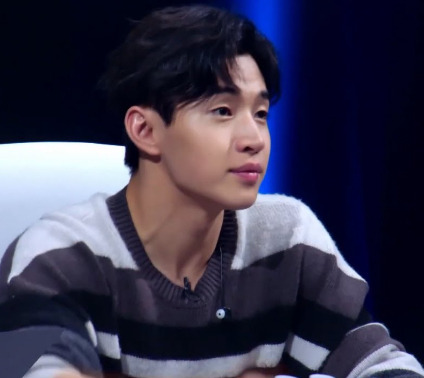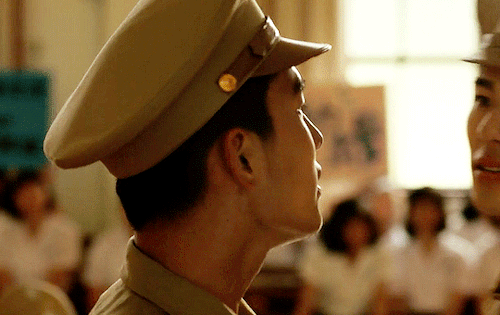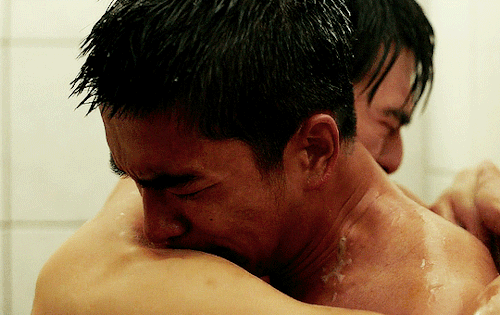I Now Own Stars Of Chaos, Vol 1!!! And Pre-ordered Vol. 2 While I Was Out!! Yay!!!
I now own Stars of Chaos, Vol 1!!! And pre-ordered Vol. 2 while I was out!! Yay!!!

And now, a brief yet pathetic looking-for-sympathy note:
The 南疆山匪 (southern border mountain bandits??) arc is So Hard for me! It’s all “This character who is a friend of that character who you just met is laying a trap for this other character who is a friend of yet another character that you have Not yet met yet, plot plot convoluted plot” with absolutely no kissing and practically no pining and this is exactly why I am re-reading 杀破狼 Stars of Chaos while making a chapter-by-chapter Notes document of Romance Only for future rereads.
My 杀破狼 Romance Only Notes only have a couple of paragraphs from Ch 40, and it doesn’t look like I’ll have much from Ch 41.
This is taking too much discipline to read.
Priest, give me less massacring and more Mutual Magnetism!
More Posts from Weishenmewwx and Others
Terms You Might Want To Know For Your Wuxia/Xianxia Fic
MXTX's danmei are getting increasingly popular, and the fandoms are getting more fic-happy. I've noticed that some writers seem interested in writing their own fics but are concerned of making mistakes with niche honorifics and titles. I've noticed some that have jumped right in, but have made innocent errors that I'd like to correct but fear coming off as rude or presumptuous. And so I've made this list of terms that covers the basics and also some that are a little more niche since they're usually directly translated in cnovels.
DISCLAIMER: This is by no means a comprehensive list of everything one needs to know or would want to know concerning ancient Chinese honorifics and titles, merely what I myself consider useful to keep in mind.
Titles
Shifu: 'Martial father'; gender-neutral
Shizun: 'Martial father'; more formal than 'shifu'; gender-neutral
Shimu: ‘Martial mother’; wife of your martial teacher
Shiniang: ‘Martial mother’; wife of your martial teacher who is also a martial teacher
Shibo: elder apprentice-brother of your shifu; gender-neutral
Shishu: younger apprentice-brother of your shifu; gender-neutral
Shigu: apprentice-sister of your shifu
Shizhi: your martial nephew/niece
Shimei: younger female apprentice of the same generation as you
Shijie: elder female apprentice of the same generation as you
Shidi: younger male apprentice of the same generation as you
Shixiong: elder male apprentice of the same generation as you
Shige: elder male apprentice of the same generation as you, specifically one who has the same shifu as you or is the son of your shifu
Zhanglao: an elder of your sect
Zhangbei: a senior of your sect
Qianbei: a senior not of your sect
Wanbei: a junior not of your sect
Zongzhu: Address for a clan leader
Zhangmen: address for a sect leader
Daozhang: Daoist priests or simply a cultivator in general; gender-neutral
Daogu: Daoist priestess or a female cultivator; not as commonly used as 'daozhang'
Xiangu: Daoist priestess or a female cultivator; not as commonly used as 'daogu'
Sanren: a wandering cultivator
Xianren: 'Immortal Official'; a title of respect and power like 'General'
Xiuzhe: 'Cultivator', can be shortened to 'Xiu'
Xianjun: 'Immortal Master/Lord'
Xianshi: 'Immortal Master/Teacher'
Dashi: 'Great Teacher', address for monks
Xiansheng: Teacher/Sir; in ancient China, the connotation is very scholastic
Houye: address for a duke
Jueye: address for a noble lord, ei. a duke, marquess, earl, etc.
Wangye: address for king/imperial prince
Daren: address for imperial officials
Furen: Madam; the wife of an imperial official/nobleman OR a married woman granted a rank by the royal family
Nushi: Madam; the counterpart of 'xiansheng', connotation is scholastic
Taitai: Madam; address for an old married woman of the gentry, either wife or mother to head of household
Laoye: Old Lord; Address for an adult man with adult children of the gentry; possibly head of household
Nainai: Madam; Address for a married woman of the gentry, possibly wife of head of household
Ye: Lord; address for an adult man of the gentry, possibly head of household
Shaonainai: Young Madam; address for a woman married to a young man of the gentry
Shaoye: Young Lord; address for a young man or boy of the gentry, generation lower than head of household
Xiaoye: Little Lord; can be a synonym for ‘shaoye’ OR the son of a shaoye if ‘shaoye’ is already being used within the family
Xiaojie: Young Mistress; address for an unmarried woman or young girl of . . . the gentry and only the gentry, I believe. Correct me if you know for certain this is incorrect. (WARNING - It's an archaic term that should really only be used in an archaic setting if being used as a title instead of a suffix, because the modern vernacular has it as a term for a prostitute in mainland China. [Surname]-xiaojie is fine; Xiaojie by itself should be avoided.)
Gongzi: ‘Young Master/Lord/Sir'; ‘Childe’; young man from a household of the noble or gentry class
Guniang: 'Young Master/Lady/Miss'; ‘Maiden’; an unmarried woman or young girl from a household of the noble or gentry class
Laozhang: 'Old battle'; polite address for an unrelated old man of lower status than you
Laobo: polite address for an unrelated old man of a higher status that you
Laotou: 'Old man'; informal but not derogatory, implies fondness/closeness
Laopopo: 'Old woman'; informal but not derogatory, implies fondness/closeness
Please note that all of these listed above can be used as stand-alone titles or as suffixed honorifics.
Strictly Prefix/Suffix
-shi: 'Clan'; the suffix for a married woman, essentially means 'née'. (ex. Say Wei Wuxian was a woman and married into the Lan clan through a standard marriage. She would be called 'Wei-shi' by her husband's contemporaries and elders when not in a formal setting. It implies lack of closeness; used by acquaintances.)
a-: A prefix that shows affection or intimacy.
-er: A suffix that shows affection or intimacy; typically for children or those younger than you
-jun: 'Nobleman'; a suffix for a greatly respected man
-zun: 'Revered One'; a suffix for a greatly respected man
-ji: A suffix for a female friend
-bo: A suffix for an older man of your grandparents' generation
-po: A suffix for an older woman of your grandparents' generation
Stars of Chaos 杀破狼
Vol 2, Notes 4, pages 90 - 144.
Ten more pictures with notes about the novel! More text that may have been edited out of the print version!

Half of the sentence is gone!!!!!
"...and Chang Geng at that time had not even known what luxury and riches were, but had unexpectedly and resolutely left the marquis's residence; he would rather wander the wide 江湖 Jiang Hu than return to being a 'frog in a well' rich prince."
"Frog in a well" is 井底之蛙, which means "very limited worldview" since frogs in wells can't see more than their tiny patch of sky.

There is no mention of bloodlust in the version I read. It was just "In previous years, Gu Yun still frequently muttered about beating up this person or beating up that person..."

Yah. Priest has LOTS of plot. Constant bouncing between what happens in the imperial court vs in the outside-the-official-government world.

"粘". Priest even put that word in " ". It can mean sticky, adhesive. Not like a clingy girlfriend, more like magnets or glue.
It's very romantic right here, anyway. :)

Text, plus my bad handwriting: "Who knows what my brothers and comrades will think when they hear the news! What do you think, Marshal!?" meaning "What do you feel in your heart?! Do you really think this is fair?"

停 can mean "parked" or "landed," which I think makes more sense here since "stored" has the implication that the hawks are packed away, but, in this case, the hawks were flying just a little bit ago and now they are "landed," or "parked."

There some additional sentences in the version used for translation, I guess.

The Chinese from the version I read: 我若说出傅志诚私运紫流金谋反一事...
My bad translation: If I speak about Fu Zhicheng's smuggling Violet Gold conspiracy this one matter...
My interpretation: "the treason of smuggling violet gold," since he is referring to one matter, not two.
But it would not be weird if Priest later edited it into two matters of treason, one of smuggling and another of rebellion.

Chang Geng is elegant and graceful. He does not hunker. He settles.

炼丹 ”Make pills of immortality"
This "alchemy", Chinese version, is not to turn whatever into gold, but instead to find ways to extend your life; like how my mom puts turmeric in absolutely everything and reminds me to eat more blueberries and tomatoes and goji berries and...
OK! That's it for these ten photos! More later :)
My DanMei Literary Adventure Masterpost
Stars of Chaos - All Notes Links
Super-Vocal 声入人心
I have been obsessed with listening, and occasionally watching, song clips from Super Vocal recently.

Yes, yes - everyone who likes 周深 Zhou Shen had recommended to watch the whole thing multiple times, but I never had any desire to expand beyond Zhou Shen until recently.
Maybe it was seeing 刘宪华 Henry Lau's expressions as he watched other people sing.

Such a cutie. A polyglot polymath cutie with really nice abs (you all saw the movie Double World, yah?)
Or maybe it was Zheng Yunlong (I still don't think he's fair. Nothing about Zheng Yunlong is fair. Not his height, not his face, not his singing. It's just not fair. Especially when they put him in costume. Any costume. Or do his hair. Any hairstyle. )

And it's all been incredibly wonderfully ... gay? Since they only have men on the show, all the duets have been between guys. They didn't even bother changing the lyrics to pretend they were singing about girls -- it's just "Oh, 哥 big brother, I miss you" etc. So awesome.
And the men are so wonderfully put together. And talented.
Anyway, I highly recommend it. Everyone was right - Super-Vocal is totally worth listening to / watching. (Maybe someday I'll get to watch the entire thing instead of just listening at work.)
The Husky and His White Cat ShiZun v1
(English 7Seas version) Notes 2 of 2
Here are more notes from vol.1 of 2Ha!
Let's start it all off with a quick silly note.
In Chapter 1, the translators found a bunch of different words for "dog" - cur, mongrel, etc - whereas in Chinese it all was just phrases with the one word 狗。I thought it was a great translation.
Whereas here in Ch (page 184ish), the translators chose the one word "screw" while in Chinese we had all sorts of different euphemisms conveying various degrees of affection and marital harmony.
It's cute.
Here's another note on Language Use. 师尊/师父 as "Master" vs as "Teacher." Yes, the English term "master" fits as "the person who is very much higher in rank and teaches you stuff," but I feel like the Chinese ShiZun/ShiFu conveys a lot more obligation than "master." It's much closer to "teacher" or "father" than it is to "slave-holder."
(More notes and photos under the cut...)
It's the teacher's duty to make sure that their students are learning well. A teacher's reputation rests entirely upon their students' character and accomplishments. Students are supposed to trust their teacher as they would their own parent, and teachers are supposed to honor and live up to that trust.
Anyway, that's why on page 307 I crossed out "master" and wrote in "teacher," instead. Chu Wanning saw it as his duty to raise Mo Ran right, and if Mo Ran turned out wrong, it must have been Chu Wanning's fault. Yeah.
Anyway, here we are. Volume 1, page 184 - end.





















MDZS Resources & References:
OR, a collection of meta fiction for MDZS writers and enthusiasts:
Grandmaster of Demonic Timeline by chrisemrys
The timeline of Wei Wuxian’s life with some bonus, worked for my own notes and shared for understanding of my MDZS fic(s)!
MDZS Timeline by thewickling (Diviana)
A guide to MDZS’s confusing chronology that I unwrangle in my spare time.
On Character’s Ages by thewickling (Diviana)
A collection of meta on the possible ages for different characters in MDZS and what ages they would be during key events in the timeline.
Mo Dao Zu Shi Writer Reference: Novel Chapter Summaries by threerings
A breakdown of all the chapters in the Mo Dao Zu Shi/ Grandmaster of Demonic Cultivation novel, with what happens when. To help in referring back to specific scenes, because who can remember with every version happening in a different order.
Reference for Modao Zushi Writers: Chinese terms & Naming Conventions by chaoticjoy
This is to provide a reference for writers who are unfamiliar with Chinese literary conventions or terms used in canon. Hopefully someone will find this helpful.
Chinese naming basis for fanfiction writers by miqqumi
I notice a lot of people struggling with how to use Chinese names in fanfic, so I put together a guide. I hope it’s helpful to someone.
The Untamed / MDZS, resources link post, stuff I needed as a writer by AteanaLenn
Discovering and writing in a new fandom is difficult, but especially in one whose culture you know nothing about. I started writing a The Untamed fic the other day, and ended up spending hours looking up reference posts and blog posts, in order to try and avoid the most obvious mistakes at least.
Eventually, I ended with a lot of info, so here you go, useful stuff I found to understand this fandom.
MDZS Audio Drama Episode Guide by pumpkinpaix
An episode guide for all seasons of the MDZS Audio Drama, so if you’re searching for a specific scene/quote, it’s easier to find. A breakdown of novel chapters already exists, courtesy of the wonderful threerings, but the audio drama does slightly different things and has some really beautiful changes/scripting, so this is a supplemental guide for anyone who wants to reference the AD instead of the novel for any reason.
Obviously, spoilers for the entirety of the plot.
MDZS Meta Collection on AO3
MDZS Vol 2 Annotations, part 6
Here is Part 6 of my annotations of MDZS Volume 2, pages 321 - 351.












Thanks for reading! Let me know if any of my notes are too fuzzy or squiggly to read, and I'll let you know what I meant to write.







YOUR NAME ENGRAVED HEREIN (2020)
Do you think the world has changed?
Stars of Chaos 杀破狼
Vol 2, Notes 2. Pages 48 - 62.
Ten more pages of notes...

饮鸩止渴 drink poison (legendary bird with poisonous feathers) stop thirst. It's a cool way to say "What you're doing may be helping you in the short term, but it's killing you in the long term," yah?

I really like how in Chinese, each rank of royalty has its own honorific, so when Chen QingXu says "殿下," we know she means "the prince" (or similar ranking), not "the emperor."

"陈轻絮管杀不管埋" "Chen QingXu took care of killing but did not take care of burying." ie She didn't deal with the consequences of her actions, but satisfyingly symmetrical in Chinese.
。゚ ( ゚≧ᗜ≦^゚)゚。

得罪君子不得罪小人。(Because, you know, an upstanding gentleman might get mad, but he won't resort to dirty underhanded deeds to get his revenge on you, whereas you never know what low deeds a petty person will stoop to to get his revenge.)

Top: 肉麻 is a cool word. We don't really have it in English. It's a little like "cringy"? It's how you feel when someone does something too romantic or overly emotional in front of you.
Bottom: I guess Chinese crows foretell misfortune.

Formatting again. I really appreciate paragraph breaks.

Characters = words, reading, literacy. (Not "characters" as in "people.")

Missing paragraph in the print edition, again. But I really like this paragraph!
In case you can't read my writing: Shen Yi is feeling sorry for himself. Gu Yun grew up as a rich boy yelling "Mommy!" When he got older and joined the Black Iron Battalion, he didn't have a mommy anymore, so he treated Shen Yi as his new "Mommy!" to take care of things for him.
Below the missing paragraph, I have a note that "Dage" is 大哥 = Big Brother = "Boss," like you would call a mob boss "Boss."
And below that, in the online version, the entire quote from the bandit is "废话,还不放箭!包围!包围!” = "Nonsense. Why haven't you released the arrows yet! Surround them! Surround them!"

谁不想死谁先死. "Who does not want to die, who first dies." It's very symmetrical in Chinese.
The other note is about how we call people we deem useless as "饭桶 rice barrel," because all they do is eat rice.

老大 old big = Boss.
说人话 talk human speech = talk like a normal human being!
人模狗样 human, mold/model, dog, type/shape. It's a disparaging way to say "poser!" (Dogs are generally looked down upon in Chinese culture, at least in compound words and idioms and such.)
OK. And this ten is done!
My DanMei Literary Adventure Masterpost
Stars of Chaos - All Notes Links
-
 kamikazeworld liked this · 1 year ago
kamikazeworld liked this · 1 year ago -
 mrmissmrsrandom liked this · 1 year ago
mrmissmrsrandom liked this · 1 year ago -
 fengshenjunlang liked this · 1 year ago
fengshenjunlang liked this · 1 year ago -
 weishenmewwx reblogged this · 1 year ago
weishenmewwx reblogged this · 1 year ago
